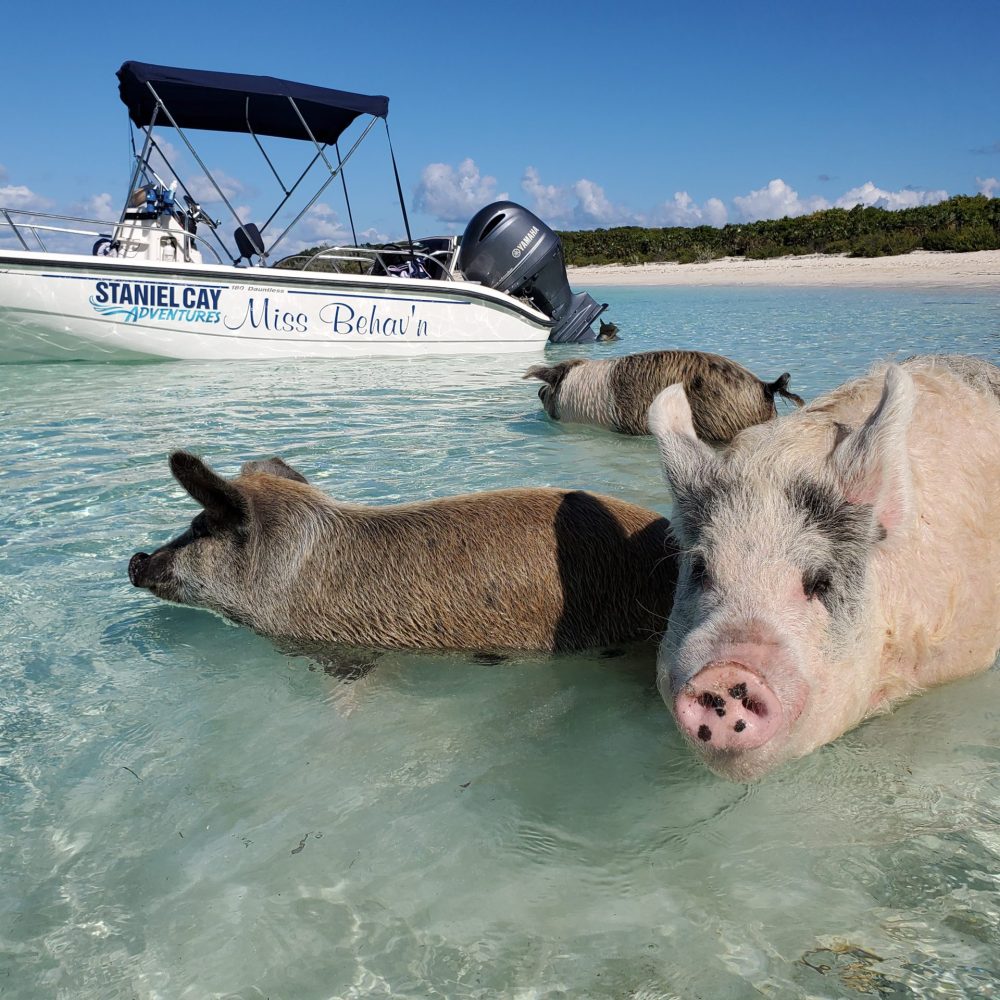Staniel Cay Adventures
Ting’s To Say
Exuma Cays Bahamas
The Bahamas has its creole dialect. While British English is the official language, you’ll also hear accents and words or phrases influenced by various African languages. British English is spoken everywhere in The Bahamas, but when you travel to Staniel Cay, you’ll notice that locals speak with a pleasing Island dialect. You certainly won’t need to bring your translator to Staniel Cay to communicate, but it’s fun to brush up on a bit of the local language before you visit!
You think you know English until you get off da plane, axe fa one taxi an’ den realize you mussy ain know what dat custom lady say… Every island has its own patois, creole, or pidgin English that is spoken by natives, locals, and residents alike. Take a peek into the rich language of the Bahamas, while exploring the sights and sounds of the largest island chain in the Caribbean. Get ready to learn some often-used Bahamian phrases:EEN NOTHIN’: A common reply to “what da wybe is?”, this means “nothing much!”
SWITCHA: If it’s a hot day and someone offers you a glass of switcha, don’t refuse! “Switcha” is the Bahamian word for lemonade. In The Bahamas, it’s commonly made with limes instead of lemons. Either way, it’ll be delicious and refreshing!
WELL MUDDA SICK!: Bahamians use this phrase to express surprise or excitement, similar to saying “you’re kidding!” Often it’s also shortened to “Mudda Sick!”
DEM: This is a word Bahamians may use to refer to a group of people. For example, if you hear “David’s eating at the Fish Fry with Johnny dem”, it would mean David’s eating with Johnny and others.
POTCAKE: A potcake isn’t an after-dinner treat, as you might expect, but rather a stray dog. Potcakes are generally mixed breeds and got their nickname from being fed leftovers or scraps from the cooking pot at the end of a meal.
Sipsip (noun): If you’ve been away from the island for a while and want to catch up on what you’ve missed, you may ask a friend to give you the “sipsip.” This is the Bahamian word for gossip, deriving from a simple repetition of the word’s second syllable, “sip.” Here’s how you may hear the term used in a conversation: “So what’s been goin’ on, man? Gimme’ the sipsip.”
Sometimey (adjective): Many parents would describe their teenagers as sometimey, meaning that they tend to be moody. This word has come from the implication that moody people will sometimes be angry, sometimes upset, sometimes happy, et cetera; just making them a “sometimey” person. If you hear this word in a conversation, it may sound like this: “I don’t like dealin’ with her, she too sometimey.”
Cut-hip (noun or verb): If a child grows to be too sometimey, they may find themselves with a cut-hip. A cut-hip is a Bahamian term for a beating. To put the noun in motion, if you are going to cut someone’s hip, you’re going to beat them. For instance, one might say, “He too rude, he need’ a cut-hip.” or “My teacher cut my hip so much in primary school!”
Jam up (adjective): A perfect example of a jam up place is Wendy’s, Mackey Street on any given day. If somewhere is “jam up”, it’s too crowded. It’s probable that this slang comes from the term “jam-packed”, with a twist using the classic Bahamian practice of adding “up” to an adjective to exaggerate it, i.e. “fresh up, mash up, all loud up.” You might hear this term in a sentence like this: “I couldn’t have fun at that party, man, it was too jam up.”
Bush crack man gone (…we’re not quite sure how to classify this one): This term can be translated to a proverb, meaning “when trouble comes, run.” For example, when discussing the aftermath of a fight, one Bahamian might tell another, “Soon as I saw that first punch last night, bush crack man gone!”
TING: “Ting” means “thing”, “tanks” means “thanks” – in Bahamian dialect, the “h” often gets dropped.
| Biggety: | Bold or loud |
| Buck up: | To run into something or someone |
| Chirren: | Children |
| Cut Eye: | To give somebody a dirty look |
| Erl: | Oil applies to both motor oil and cooking oil |
| Ferl: | Aluminum Foil Real Bahamian women always carry some in their purse you never know when the buffet is going to provide tomorrow’s lunch! |
| Gat: | Got (or has) |
| Gattee: | Have to |
| Gumma Dat: | Give me some of that |
| I’s: | I am |
| Musse: | Must be |
| Gone: | Bye |
| Grabalishus: | Greedy |
| Jam up: | Crowded |
| Jook: | To poke or stab |
| Kerpunkle up: | Drunk |
| Muddo or Muddasick: | Holy Cow! |
| No Broughtupsy: | Bad mannered |
| Pikney: | Small child |
| Sip sip: | Gossip |
| Sky Juice: | Gin and Coconut Water |
| Slam Bam: | Sausage and bread sandwich |
| Sweetheart: | To cheat on your spouse or significant other |
| Tief: | To steal |
| Tingum: | A person, place or thing |
| Yinna: | You |















